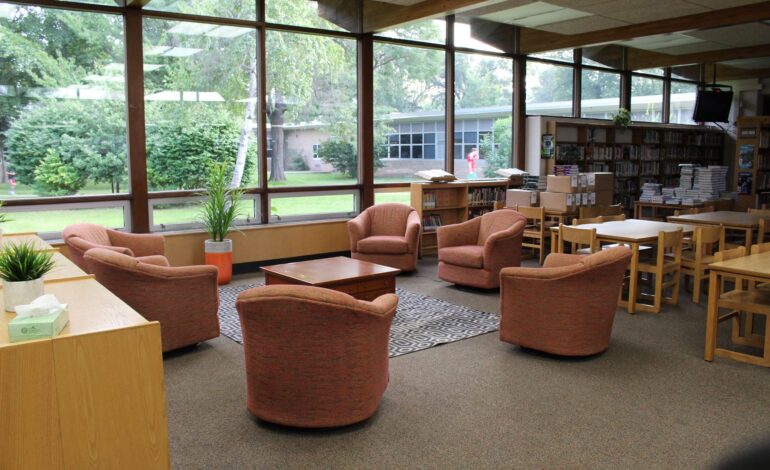DEARBORN — Dearborn Public Schools temporarily restricted access to seven books in their libraries after a parent had brought complaints about their content and said the texts contain obscenity.
Four of these are physical, three electronic (through the SORA e-book app curated by OverDrive to give students access to e-books in the Wayne Consortium).
The seven books are: Push by Sapphire; All Boys Aren’t Blue by George M. Johnson (“SORA only, not a physical copy in our collection”); And They Lived by Steven Salvatore (only a Dearborn Public Library book, never was a part of the school collection); The Lovely Bones by Alice Sebold; Eleanor & Park by Rainbow Rowell; Red, White and Royal Blue by Casey Mcquiston and This Book is Gay by Juno Dawson (SORA only, not a physical copy in our collection). This list was confirmed by the district after an inquiry by The Arab American News.
What (at most, generally) ties these narratives is their interrogation of and engagement with questions and topics of gender and sexuality, specifically though queer perspectives.
The board’s decision comes during a contentious national moment regarding public education in relation to LGBTQ+ movement and queer literature, as public schools across the country are debating on what sorts of texts should (or not) be accessible to students in their library centers.
The seven books are: Push by Sapphire; All Boys Aren’t Blue by George M. Johnson (“SORA only, not a physical copy in our collection”); And They Lived by Steven Salvatore (only Dearborn Public Library book never was a part of the school collection); The Lovely Bones by Alice Sebold; Eleanor & Park by Rainbow Rowell; Red, White and Royal Blue by Casey Mcquiston and This Book is Gay by Juno Dawson (“SORA only, not a physical copy in our collection”).
Some parents in Dearborn and other school districts around the country have taken issue with This Book is Gay in particular, which according to its author, serves as a candid and uncensored “manual for everyone -no matter your gender or sexual preference” that covers topics like sex, dating and more to fill gaps in sex education as it pertains to same-sex couples.
“So why don’t we teach you about same-sex couples when we teach sex ed?” Dawson asks in the book. “Or that a lot of people choose their gender? Well, I was a PSHCE (Personal, Social, Health and Citizenship) teacher for a long time, and I always taught my students about these things, but not all schools do, and not all teachers know how – there’s NO training for this, I’m afraid.”
Though there certainly has been homophobic pushback against the book, some community members and parents say it’s the explicit nature of the book alone, and not the LGBTQ+ themes, that they object to. Others, like Dearborn City Councilwoman Erin Byrnes say removing books with queer themes from high school libraries will not enhance the acumen of students, “nor will it encourage them to be inclusive and welcoming of their peers.”
“It is the job of librarians to stack the shelves with books that encourage critical thinking and questioning,” Byrnes said on Facebook. “Isn’t that what learning is all about? And don’t get me started on how highly-trained and skilled librarians are, and the fact that they are stalwarts of our democracy which is predicated upon freedom of speech.”
Examining books
On September 12, Dearborn’s Board of Education meeting discussed the making of a book-reviewing committee, under which procedures will decide whether to rescind or uphold the restriction. These procedures, and the committee’s status as either permanent or provisional, was not specified. There was also discussion of sifting through the libraries to examine whether books are deemed age-appropriate and educationally befitting — there are around 300,000 books, but approximately 100,000 discrete titles, meaning this process, necessarily, would require time and resources.
One member brought up the possibility that parents might have the choice to refuse library cards to their children, analogous to, say, not signing a child’s permission slip for sex education classes, and even a forum to allow parents and students to flag any material that they would find concerning. There will also be new criteria, again, not enumerated and yet to be drawn up, for new purchases made by the libraries.
And yet, any form of argument for what books need to be removed from the libraries is predicated on the assumption that kids in the schools even check out books and read in the first place.
During the meeting, Ammerah Saidi, a teacher at DPS, pointed out students’ concerning lack of interest in books.
“As an English teacher, I wish my students were reading physical books from our libraries,” she said. “….Every year, I ask my students how many books they’ve read, and the number is a whopping zero by the time they reach me by middle and high school. I have to personally assign high school and middle school students a grade for getting a city library card because many have never visited one in our city.”
Saidi mentioned that social media and Internet use might indeed be far more threatening to a child’s education than any book in a well-curated library might.
“They read everything on the World Wide Web,” Saidi said. “First graders who have watched Squid Game with explicit sex scenes, and sixth graders who show me how to bypass school firewalls. I truly cannot stress the horrific things children have admitted to me and other teachers about what they frequently search and access. I am not a luddite, not condemning technology, but I am stressing what we are up against as teachers. I am begging parents to work with us as we help develop healthy, literate, critical thinkers ready to engage in our democracy.”
During the board meeting, one Dearborn resident voiced his concern for the presence of books with obscene material in the schools’ libraries.
“We’re not against the LGBTQ community, as some are trying to portray,” Dearborn resident Mike Hacham said. “We’re just against trying to groom our kids into something they’re not ready for… but if we’re going to groom them at a young age, then I want the Bible, Quran, and Torah in our classrooms… to face these books that are grooming our children for failure…. for things they don’t need to be involved in at the age of 13.”
And as to the question of a school district’s legislative authority to restrict or ban books, the U.S. Supreme Court has granted such, but only under specific conditions.
In the Board of Education, Island Trees Union Free School District No. 26 v. Pico, the Court ruled that if there exists any political, social or religious reason behind a book’s ban, this is a violation of First Amendment rights; if the motivation, however, is nondiscriminatory (i.e., concerns about the obscenity of texts and the question of their educational value), then the school district is granted discretion to decide a text’s availability to their enrolled students.
Schools have always had to work within federal and state law, but even more important, they must also consider the attitudes, beliefs and customs of the local community they serve… No one is promoting any one religion, but we are acknowledging the beliefs in our local community and how they will affect the operation of the schools. – Dearborn Public Schools
For now, it remains to be seen how this new book-reviewing committee will function and for exactly what ends its decisions will be made.
David Mustonen, communications director for the DPS, sent the following response to The Arab American News by email:
The Dearborn Public Schools has not banned any books. We will be evaluating books to ensure they are age appropriate and if the content is being presented in an appropriate context. There are seven books (four physical books and three accessible through an on-line service) that will be reviewed once all of the procedures and processes for a book review have been completed. We expect the details related to the review process, including information about the make-up of a book review committee, will be ready by next week.
Student access to SORA, the web-based system that provides access to e-books in the Wayne consortium, has been temporarily removed while the district works with Overdrive (the company that manages that software) to develop a way to manage what books are available at different grade levels.
Students in Dearborn still have access to a collection of over 350,000 books with more than 100,000 unique titles. That doesn’t include any books that are also available in classrooms.
Currently, there is a national discussion regarding what books should or should not be available in a school media center and school districts across the country are addressing these concerns. It is a topic that brings out emotions and viewpoints on both sides of the issue. There are a number of people who don’t want certain books available to their children and there are an equal number who are afraid this is going to end up with books being banned and limiting access to a wide variety of ideas, thoughts and concepts. It is highly emotional, highly divided and school districts are left in the middle to figure it out.
Schools have always had to work within federal and state law, but even more important, they must also consider the attitudes, beliefs and customs of the local community they serve. For some topics this is easy. For example, a rural community might have the day off on the first day of hunting season in response to local customs. In Dearborn, the district has scheduled days off during the Eid as we know there will be many staff and students who will not be in attendance. In other communities only a few miles from Dearborn this occurs during the Jewish holidays. And we all have days off during Christmas. No one is promoting any one religion, but we are acknowledging the beliefs in our local community and how they will affect the operation of the schools. These are the easy topics to address, but when you are talking about something that is more emotional, more tied to someone’s core principles, then the discussion and actions become much more difficult.
There is a protest planned by a group that opposes the books and wants them removed from local schools, this Sunday at the Henry Ford Centennial Library on Michigan Avenue.







Leave a Reply